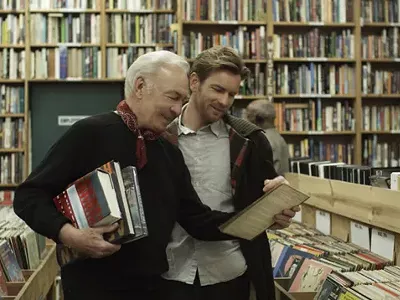
Audio By Carbonatix
[
{
"name": "GPT - Leaderboard - Inline - Content",
"component": "35519556",
"insertPoint": "5th",
"startingPoint": "3",
"requiredCountToDisplay": "3",
"maxInsertions": 100,
"adList": [
{
"adPreset": "LeaderboardInline"
}
]
}
]
It's summer: You're sitting on the porch, ankles crossed on the railing. You're swaying under shade in a hammock. You're splayed out on the beach, propped on your elbows, toes in the sand. You're in bed. You're at the bar. Maybe you're even at work. In any event, your nose is in a book. But what book? It's a tough call. We asked some Detroit lit-lovers what they were reading or what they'd recommend.
I'm going to be reading two books: The first is The Sojourn by Andrew Krivak, a coming-of-age novel centered around World War I that got some really nice reviews from the L.A. Times and the Christian Science Monitor. I'm also going to read Adam Hochschild's To End All Wars as a nonfiction counterpoint on the same subject, because Hochschild's King Leopold's Ghost is one of the best histories I've ever read. So, if you're around me this summer, prepare to hear a lot of poetic anecdotes about Passchendaele and Verdun. Oh, yeah, I'm gonna be fun! —Toby Barlow, co-president and executive creative director of JWT Team Detroit and author of Sharp Teeth.
I am staking out the summer for a long-delayed reckoning. After falling in love with the lessons afforded by failure, I have returned to a book that transmutes despair into longing, The Beauty of the Husband: A Fictional Essay in 29 Tangos by Anne Carson. Appropriately, I am reading an uncorrected proof. Turn out the lights. —Leon Johnson, professor and chair of fine arts, College for Creative Studies
Rule of the Bone by Russell Banks is an all-time favorite summer read. The story, told in first person, follows a 14-year-old high school dropout and misfit named Chappie. Through a series of events, he is led away from his home in the Adirondacks, reinvents himself as "Bone," and meets his destiny in another country. It's a brilliant, modern Huck Finn. Read this book if you want to find the next best thing to Catcher in the Rye. —Torya Blanchard, restaurateur (Good Girls Go To Paris, Rodin, Ootie's) and host of Tonight at the CAID.
I'm super-excited about Amy Martin's new children's book, Symphony City, published by McSweeney's. We're planning a book-signing at Bureau of Urban Living when she returns home in July. Amy is such a talented illustrator, I can't wait to see it. It's about a young girl lost in a big city who makes her way home by following the rich and vibrant music of the streets. An exciting adventure for children and parents who love music, art and big imaginations. I'm also rereading The Death and Life of Great American Cities by Jane Jacobs and The High Cost of Free Parking by Donald C. Shoup, both super-relevant for some projects I'm working on in Detroit right now. And, for fun, I'll check out Tina Fey's Bossypants. —Claire Nelson, Bureau of Urban Living, Open City
Summer makes me want to go places. The warm weather always feels like a call to travel, a time to see something entirely new. When I can't actually get on the road, though, I look for new worlds in books. Right now, I'm completely trapped inside of Ben Katchor's new graphic novel, The Cardboard Valise. The book tells the loosely intertwined stories of "xenophiliac" Emile Delilah, "supranationalist" Elijah Salamis and Boreal Rince, the exiled king of Outer Canthus. Katchor is a master of oblique reference, and here he builds a surreal world that somehow feels both foreign and exactly like our own. This is the kind of place where one visits "world famous bathroom ruins" and eats a "humane" hamburger for lunch, a place packed with the kind of meaning that's always just out of view. It's a book for people who like the feeling of going somewhere new, and getting completely lost. —Greg Lenhoff, Leopold's Books
With The Greater Journey: Americans in Paris, David G. McCullough tells the story of known and unknown Americans — among them Hawthorne, Twain, Emerson, Fenimore Cooper, Mary Cassatt and Oliver Wendell Holmes — who headed east to Paris (from 1830 to 1900) and wound up shaping America's culture. I'll also be checking out Reimagining Detroit: Opportunities for Redefining an American City by John Gallagher. He looks at various ways in which a city built on industry and manufacturing, a city the size of San Francisco, Boston and Manhattan thrown together, can launch a serious comeback. He talks land banks, urban farms and transit. —AJ O'Neil, AJ's Cafe�
I just read Lynn Crawford's Simply Separate People, Two. It's cool and smart. I like the way Crawford builds her book by reusing other writer's characters. She, like, steps into the skins of famous dead authors, and puts on their old stories and creates great tributes by reworking and rebuilding them. Part of that is like a weird writer's exercise, but it's done so well that it makes you appreciate the old stories and, at the same time, marvel at the strange birth of the new ones, Lynn's stories. Maybe this sounds too complicated, but it's not. Lynn keeps it real. You don't have to know anything about Hemingway or Henry James to enjoy following her people around. Next, I'd like to read her earlier book, Simply Separate People, the first one. —Steve Hughes, publisher of Stupor
Now that I'm out of school (forever!) I have time to read "just because" again. Tough choice trying to narrow down to just a couple, but here are three goodies from the top of the double stack: On With Others by C.D. Wright, a poetic take on the civil rights movement; A Death in the Family by James Agee, which I reread every few years; and Erroll Garner, a bio by James M. Doran. —Bill Harris, recently retired Wayne State University English professor and author of Birth of a Notion; Or, The Half Ain't Never Been Told: A Narrative Account with Entertaining Passages of the State of Minstrelsy & of America & the True Relation Thereof (From the Ha Ha Dark Side).
I am looking forward to reading David Mamet's The Secret Knowledge: On the Dismantling of American Culture this summer. Pulitzer Prize-winning playwright, screenwriter and director David Mamet re-examines his worldview in light of an epiphany he had while listening to the radio and driving in his car with his wife. According to his now-famous (or infamous, depending on your political stripes) and potentially career-ending essay in the Village Voice, "Why I Am No Longer a Brain-Dead Liberal": "We were riding along and listening to NPR. I felt my facial muscles tightening, and the words beginning to form in my mind: Shut the fuck up." Based on excerpts that I have read, this is neither a knee-jerk outburst of "get off my lawn" grumpiness, nor an "America: love it or leave it" diatribe. The author presents a brave and thoughtful autobiography of political and philosophical transformation. I'll be curious to see what kind of reviews this "turncoat" receives for any upcoming plays or films he pens or directs. Unfortunately, I think I already know. —Dan DeMaggio, spoken word performer and past MT contributor
My summer reading list includes Dreams of Joy by Lisa See, because Snow Flower and the Secret Fan and Shanghai Girls, two of Lee's previous works, were enthralling and wonderful, well-told novels about female friendships, a perfect thing to lounge on the beach of Lake Huron with. Dreams of Joy is a sequel to Shanghai Girls, taking the reader back to the Chinatown of Los Angeles in the late 1950s. I also want to read Swimming in the Steno Pool: A Retro Guide to Making it in the Office by Lynn Peril. As a former temp worker, I'm curious about the history and rise the profession of secretary. Told from a feminist viewpoint, the book traces the evolution of secretaries from after the Civil War to the present day. Peril also considers the parallels between women's place in the office as well as society as a whole. A little heavier than your average beach reading, but looks to be well worth it. Finally, I want to read Insider Histories of the Vietnam Era Underground Press, Part 1 by Ken Wachsberger (Michigan State U. Press). I'm hoping this one will compliment Smoking Typewriters by John McMillan. Not a history, but a collection of essays from that time period, I'm interested to see if anything from the Fifth Estate made the cut. Biographies set the essays in context, and the book includes pieces from Native Americans and gay writers. It looks to be a worthwhile read. (And it should tide me over until Wayne State Press releases its fall catalog. I'm waiting for Richard Bak's Detroitland.) —Evelyn Aschenbrenner






